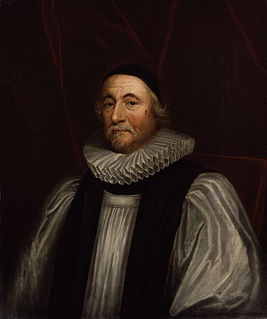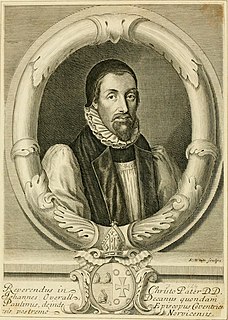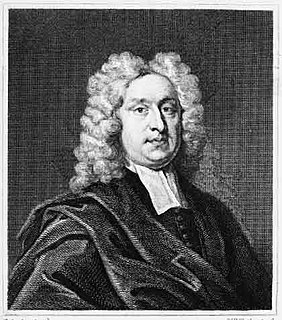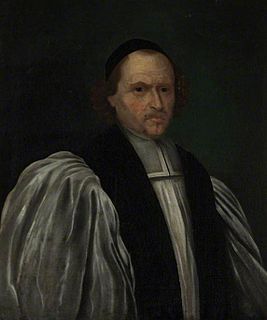Related Research Articles
Henry Ainsworth (1571–1622) was an English Nonconformist clergyman and scholar. He led the Ancient Church, a Brownist or English Separatist congregation in Amsterdam alongside Francis Johnson from 1597, and after their split led his own congregation. His translations of and commentaries on the Hebrew scriptures were influential for centuries.

James Ussher was the Church of Ireland Archbishop of Armagh and Primate of All Ireland between 1625 and 1656. He was a prolific scholar and church leader, who today is most famous for his identification of the genuine letters of the church father, Ignatius of Antioch, and for his chronology that sought to establish the time and date of the creation as "the entrance of the night preceding the 23rd day of October... the year before Christ 4004"; that is, around 6 pm on 22 October 4004 BC, per the proleptic Julian calendar.

Samuel Harsnett, born Samuel Halsnoth, was an English writer on religion and Archbishop of York from 1629.

John Bramhall was an Archbishop of Armagh, and an Anglican theologian and apologist. He was a noted controversialist who doggedly defended the English Church from both Puritan and Roman Catholic accusations, as well as the materialism of Thomas Hobbes.

Samuel Ward (1572–1643) was an English academic and a master at the University of Cambridge. He served as one of the delegates from the Church of England to the Synod of Dort.

John Overall (1559–1619) was the 38th bishop of the see of Norwich from 1618 until his death one year later. He had previously served as Bishop of Coventry and Lichfield, as Dean of St Paul's Cathedral from 1601, as Master of Catharine Hall from 1598, and as Regius Professor of Divinity at Cambridge University from 1596. He also served on the Court of High Commission and as a Translator of the King James Version of the Bible.

Edmund Calamy was an English Nonconformist churchman and historian.

John Thornborough (1551–1641) was an English bishop.

William Piers was Vice-Chancellor of Oxford University from 1621 to 1624, Bishop of Peterborough from 1630 to 1632 and Bishop of Bath and Wells from 1632 to his death in 1670.
Anthony Wotton was an English clergyman and controversialist, of Puritan views. He was the first Gresham Professor of Divinity. Christopher Hill describes him as a Modernist and Ramist.
John Downame (Downham) (1571–1652) was an English Puritan clergyman and theologian in London, who came to prominence in the 1640s, when he worked closely with the Westminster Assembly. He is now remembered for his writings.

Samuel Ward (1577–1640) was an English Puritan minister of Ipswich.

John Collinges (1623–1690) was an English Presbyterian theologian, and prolific writer. He lived and worked in Norwich for more than forty years where he played a major role in reviving and administering the City Library. He was one of the representatives of the Presbyterians in the Savoy Conference, but was later forced to resign his livings.
Francis Mason (c.1566–1621) was an English churchman, archdeacon of Norfolk and author of Of the Consecration of the Bishops in the Church of England (1613), a defence of the Church of England and the first serious rebuttal of the Nag's Head Fable put about as denigration of Matthew Parker and Anglican orders.
John Darrell was an Anglican clergyman noted for his Puritan views and his practice as an exorcist.
Richard Cheyney was an English churchman, bishop of Gloucester from 1562. Opposed to Calvinism, he was an isolated and embattled bishop of the reign of Elizabeth, though able to keep his see.
Sir Humphrey Lynde (1579–1636) was an English lay Puritan controversialist and politician who sat in the House of Commons in 1626.

The reign of King James I of England (1603-25) saw the continued rise of the Puritan movement in England, that began during reign of Queen Elizabeth (1558-1603), and the continued clash with the authorities of the Church of England. This eventually led to the further alienation of Anglicans and Puritans from one another in the 17th century during the reign of King Charles I (1625-49), that eventually brought about the English Civil War (1642-51), the brief rule of the Puritan Lord Protector of England Oliver Cromwell (1653-58), the English Commonwealth (1649-60), and as a result the political, religious, and civil liberty that is celebrated today in all English speaking countries.
John Bryan, D.D., was an English clergyman, an ejected minister of 1662.

Sir Richard Berkeley of Stoke Gifford, Gloucestershire was MP for Gloucestershire in 1604. He had previously served as Sheriff of Gloucestershire in 1564, and as Deputy Lieutenant of Gloucestershire. He was knighted by Queen Elizabeth I in 1568. In 1595 he was appointed Lieutenant of the Tower of London. In 1599 he was appointed custodian of Robert Devereux, 2nd Earl of Essex, who was kept under house arrest at Essex House in London. He died in 1604, whilst serving as MP, and was buried in The Gaunts Chapel, Bristol, where exists an effigy of him, which chapel had been founded in 1220 by Maurice de Gaunt, a member of the Berkeley family.
References
- ↑ Alumni Oxonienses 1500-1714, Spackman-Stepney
- ↑ Alan Ford, James Ussher (2007), p. 168.